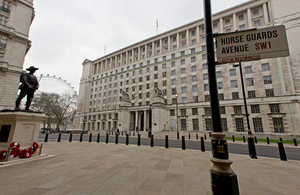- Severn Trent Water fined £1.5 million for illegal sewage discharges
- Approx 360,000 litres of sewage discharged into one brook
Severn Trent Water Limited has been fined £1.5 million for sewage discharges from 4 sewage treatment works in Worcestershire between February and August 2018. The water company has also been ordered to pay prosecution costs of £58, 365.
The court heard how the company failed to respond to alarms warning of a blockage, failed to adequately manage sewage sludge, and failed to adequately manage a situation when a piece of equipment failed. Resulting in sewage being discharged into a number of watercourses in Worcestershire.
Prosecuting for the Environment Agency, Counsel Mr James Puzey told the court that in February 2018, Severn Trent Water failed to respond promptly to alarms at its sewage treatment works at Blackminster, near Evesham. A blockage to the works resulted in approximately 360,000 litres of sewage being illegally discharged to the nearby Broadway Brook. It was hours before Severn Trent Water operatives attended to take remedial action.
The court also heard how over the winter of 2017/2018, Severn Trent Water failed to adequately manage treatment of sewage sludge at other treatment works in Worcestershire.
This caused sludge to build up within the sewage treatment system. At the company’s sewage treatment works at Bromsgrove and Stoke Prior, problems with the sewage treatment process led to discharges into the Sugar Brook and Hen Brook exceeding the permitted levels of BOD (Biological Oxygen Demand) in early March 2018.
Severn Trent Water also had problems at its Priest Bridge works near Redditch in July and August 2018, when a piece of equipment designed to remove fibrous material from incoming sewage at the start of the process failed. The company did not adequately manage the situation, which resulted in discharges from the site in breach of limits set for ammoniacal nitrogen over a 2-day period in early August 2018. A similar incident had occurred in 2011.
In passing sentence, District Judge Strongman said in respect of the Blackminster incident, “Alarms were not actioned as they should have been.” This resulted in the works “discharging for 4 hours.”
In respect of the Bromsgrove and Stoke Prior incident the judge stated, “Bad weather played a part but more should have been done to cope with the problems by way of spare capacity.”
In respect of the Priest Bridge incident, District Judge Strongman said, “There was a serious problem developing”, and that Severn Trent Water were, “in no great hurry to carry out maintenance.”
Severn Trent Water’s previous convictions were an aggravating feature of this prosecution.
A fine of £1 million was imposed for the offence at Blackminster and £500,000 for the offence at Priest Bridge. No separate penalty was imposed for breaches at Bromsgrove and Stoke Prior.
Since these incidents the company has advised the Environment Agency that it has changed its management structure and provided better technical support.
The company has also invested at the Bromsgrove works to improve treatment efficiency. Severn Trent Water Ltd have also stated that it plans to rebuild its works at Blackminster, and to close the works at Stoke Prior towards the end of the decade.
David Throup, Environment Manager for the West Midlands Area of the Environment Agency, said:
Incidents like this are preventable and are completely unacceptable, particularly at a time when the need to protect the water environment for wildlife and people has never been greater and when public consciousness on environmental matters is so high.
Water companies are aware that their activities have the potential for serious environmental impacts, and they know that we will take action when they cause pollution. The Environment Agency does and will continue to hold water companies to account when their performance falls below acceptable standards.
We’d urge anyone that sees suspected water pollution to report it to us immediately on our incident hotline 0800 80 70 60.
This conviction follows the announcement that the Environment Agency and Ofwat have both launched new investigations into sewage treatment works after new checks led to water companies admitting that they could be releasing unpermitted sewage discharges. Any company caught breaching their permits could face a range of possible enforcement action – up to and including prosecution.
Sentencing of the case brought by the Environment Agency, occurred at Kidderminster Magistrates’ Court on 7 December 2021. The company pleaded guilty to allegations at an earlier court hearing in August 2021.
Charges/breaches of permit
Severn Trent Water Limited (company number 02366686), on 20 February 2018 at Blackminster Wastewater Treatment Works, Blackminster, Worcestershire, failed to comply with condition 2.3.2 of Environmental Permit number S/16/26290/R, in that sewage was discharged into the Broadway Brook at Blackminster, Worcestershire, in conditions other than those set out in table S3.3 of the Environmental Permit, contrary to Regulation 38 (2) of the Environmental Permitting (England and Wales) Regulations 2016.
Between 3 March 2018 and 10 March 2018, at Bromsgrove Sewage Treatment Works Aston Road, Bromsgrove Severn Trent Water Limited did breach a condition of Environmental Permit S/07/56027/R in respect of upper tier limits set for Biological Oxygen Demand (BOD) in the final effluent discharging to Sugar Brook contrary to regulation 38(2) Environmental Permitting (England and Wales) Regulations 2016.
Between 5 March 2018 and 10 March 2018, at Stoke Prior Sewage Treatment Works, Stoke Prior, Bromsgrove Severn Trent Water Limited did breach a condition of Environmental Permit S/07/56078 in respect of upper tier limits set for Biological Oxygen Demand (BOD) in the final effluent discharging to Hen Brook contrary to regulation 38(2) Environmental Permitting (England and Wales) Regulations 2016.
Between 6 August 2018 and 9 August 2018 at Priest Bridge Sewage Treatment Works, Priest Bridge, Worcestershire, Severn Trent Water Limited did breach Environmental Permit S/19/26264/R Condition 3.1.1 relating to limits set for ammoniacal nitrogen contrary to Regulation 38(2) of the Environmental permitting (England & Wales) Regulations 2016.
